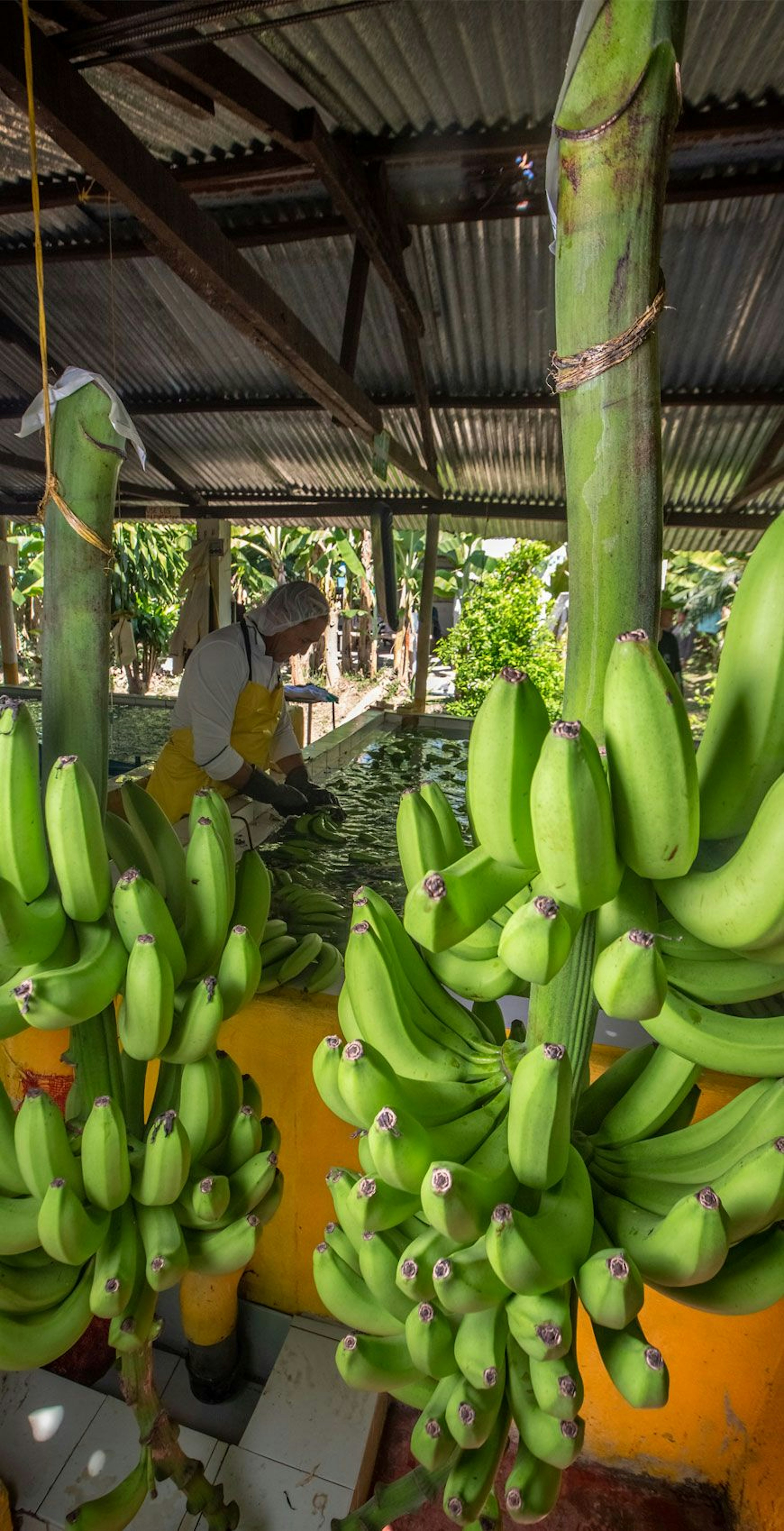Salient Issue
Labour rights & conditions
Jobs in agriculture and mining are often low paid, precarious and dangerous. Unions and collective bargaining are essential for improving conditions, but efforts to organise are often undermined by employers, informal and seasonal work contracts or prohibitive laws.
Excessive work hours are commonplace, both for small-scale farmers and farm workers. For example, in flower production in Ethiopia and Ecuador, overtime is often compulsory and not paid at all or at a premium rate. The same is reported by two-thirds of garment workers in India. Banana workers in Guatemala log 12 to 15 hours Monday through Friday, with a half-day of work on Saturday.
Injury and illness is common. Flower workers are prone to repetitive stress injuries from working in crouched and bent positions for long periods of time. More than 80% of cocoa producers in Ghana have experienced cuts, burns, back pain or other injuries. In bananas, just 20% of workers using pesticides use masks and/or gloves regularly.
Among artisanal gold miners, 25-33% of miners suffer from mercury vapor intoxication with various symptoms from headache and insomnia to kidney effects, respiratory failure and death. In processing mills, poor ventilation causes respiratory infections in sectors like cotton, cashew and rice in South Asia.
Informal and short-term work hinder access to social security and trade unions. Temporary tea workers in Kenya earn less than half of permanent employees and are ineligible for union membership. Informal seasonal work is particularly common on smallholder farms that mostly rely on family labour.
Animosity toward trade unions is widespread. One of the worst affected sectors is in bananas, where workers have been dismissed for participation in union activities and puppet unions create divisions, as documented in Colombia, Costa Rica, the Dominican Republic, Ecuador, Nicaragua and Peru. Latin American coffee plantations are riddled with similar violations. In India, caste discrimination means that union leaders do not always represent the interest of all tea estate workers.
Unionisation is also a hot topic at the consumption end of some supply chains. In the US, unionisation is low in the food and beverage industry.

According to research
Fairtrade certified plantations had improved working conditions: better workspaces, fewer working hours and improved job satisfaction.
Exploring Fairtrade’s Impact, 2022, page 31.

Action
Fairtrade's response
Fairtrade aims to fight the root causes of substandard working conditions. We believe in a worker-led approach where workers lead the negotiations to prevent, mitigate and remediate labour risks with the support of Fairtrade.
Fairtrade collaborates with labour rights organisations and others to achieve structural changes that advance the rights of all workers, not just those employed by Fairtrade certified farms and plantations. Our initiatives seek to drive change beyond the level of individual companies.
If a violation of a Fairtrade Standard requirement is found, the independent Fairtrade auditing body, FLOCERT, agrees on corrective actions with the organisation and checks their implementation.

A multi-study analysis found that
Fairtrade workers have better working conditions and benefits, and greater voice and dignity for workers in comparison to non-Fairtrade workers.
Exploring Fairtrade’s Impact, 2022, page 26.
Fairtrade response in detail
1. Preventive and mitigating measures
Fairtrade utilises a variety of tools to prevent and mitigate1 the risks regarding workers’ rights and the freedom of association at farmer cooperatives and plantations.
The Fairtrade Standards are one of these tools. Based on ILO conventions and recommendations, the Standards include several requirements on working conditions, which apply to workers employed both directly and indirectly via subcontractors:
- Tools, facilities and contracts. Plantations must offer all workers proper tools, work clothes, clean drinking water, toilets, hand washing facilities, and payslips. Written contracts must be offered to all workers employed for more than three months. Farmer cooperatives need to guarantee many of the same rights, such as protective clothing, clean water and legally binding contracts for permanent workers. Some of the requirements are applicable to farms that hire more than 10 workers for at least one month.
- Leaves and breaks. Plantations must ensure that overtime is voluntary and restricted to a reasonable amount. Sick leave, a minimum of two weeks paid annual leave, lunch breaks and legal social security are also required.
- Freedom of association (FOA). Both plantations and farmer cooperatives must respect workers’ freedom of association and collective bargaining in line with ILO Conventions2. They must allow each worker to join the workers’ organisation of their choosing – without facing any retaliation (see also non-discrimination).
- Right to Unionise Guarantee. Plantations must furthermore sign the Freedom of Association Protocol and a “Right to Unionise” Guarantee provided by Fairtrade and display the latter in local languages at the workplace. A trade union or an independent, democratically elected workers’ organisation must exist, and management must meet with its representatives at least once every three months. Where a collective bargaining agreement exists, plantations must adhere to it.
- Furthermore, there are concrete requirements on wages and gender equity.
To explore the full set of Fairtrade’s Standards on labour conditions and FOA, please see the bottom of this page.
Fairtrade also works in several other ways to improve working conditions and advance the freedom of association:
- Training. Fairtrade organises trainings to support workers and producer organisations in understanding and advancing workers’ rights. As a result of Fairtrade trainings on social, economic and environmental issues, most of the participating organisations reported taking steps to improve workers’ rights and/or labour conditions. In Latin America and Caribbean, 82 % of participants said this in a 2022 and in Asia, the number was 70 % in Fairtrade's Producer satisfaction survey for 2020.
- Social dialogue. Fairtrade works to support dialogue between workers and their employers, in collaboration with producer organisations, local unions, and labour experts. In 2024, Fairtrade Africa and Fairtrade International are funding three workshops in Côte d’Ivoire by Bananalink and a local union. The trainings intend to build workers’ capacity on topics related to workers’ rights, trade union formation and collective bargaining, and set a prime example of our work to strengthen labour relations and resolve disputes between farmer organisations and trade unions.
- Capacity building. In collaboration with trade unions and labour rights organisations, we support workers to organise and negotiate collective agreements on various aspects of decent work. Our work with the labour movement on banana plantations in Cameroon and Ghana, for example, has helped unions, employers and workers find agreements on decent wages, good labour relations, gender equity, and health and safety.
- Comprehensive programme interventions. These are often necessary to support improved working conditions. Fairtrade has partnered with organisations to support artisanal and small-scale gold miners in Peru to formalise their activities and reduce miners’ exposure to health and safety risks. In another example, Fairtrade joined forces with partners in 2022 to launch a programme to empower flower farm workers in Ethiopia, where 85 % of the workforce are either female, migrant, or under 25. This four-year programme trains workers and their unions to negotiate living wages and improved conditions, and advocate for their rights. For information on these and other current projects, please see Fairtrade’s Impact map.
- Textile Programme. Given the scale and scope of the challenges to workers’ rights and conditions in the textile industry, Fairtrade launched the Fairtrade Textile Programme. This programme aims to engage actors across the textile supply chain to build capacity for workers’ rights, living wages, and health and safety measures.
- The Fairtrade Premium. The Fairtrade Premium allows workers and farmer cooperatives to invest in projects which directly benefit workers. Find an overview of the use of Fairtrade Premium here. Plantation and factory workers elect a Fairtrade Premium Committee that puts forth proposals to all workers on how to invest the Premium. Popular investments include scholarships for children, loan programmes, home repairs or direct cash payments. Expenditures of the Premium on health, education and housing improves the standard of living of workers and their families. Premium use is checked in every audit to ensure that it is not used to pay for programmes or services that should be provided by employers according to Standards.
- Proven impact. Many studies have shown that the Fairtrade Premium has a positive impact on workers’ and their families’ lives. For example, in a study on 2023 Mauritian Fairtrade sugar cane sector 93 % of respondents reported that working conditions had improved. According to Raynolds (2020), Fairtrade supports enhanced wellbeing, stable full-time jobs and equal wages, benefits and working conditions. The majority of the Fairtrade Premium (68 %) received by hired labour organizations in 2021 was spent on services to workers and their families. During the pandemic, Fairtrade support had a proven positive impact.
- Private sector collaboration. Fairtrade encourages and offers avenues for retailers, brands and traders to invest in labour rights and better conditions in factories and farms where they source – also beyond the Fairtrade Premium. The best practice section of the Fairtrade Trader Standard encourages this.
- Increasing worker representation in Fairtrade’s governance. It is important that workers and farmers have a strong role in decision-making at Fairtrade as well. Fairtrade has a trade union representative on the Fairtrade Standards Committee – the eight-member body that debates and approves all Fairtrade Standards changes. There are also worker representatives in the General Assembly, Fairtrade’s highest decision-making body.
- Awareness-raising in consumer countries and advocacy work. Fairtrade actively advocates for meaningful Corporate Sustainability Due Diligence legislation and its thorough enforcement to address the root causes of human rights violations in global supply chains and highlights the need for fair prices, living incomes, and living wages.
Please see also the page on living wage and Fairtrade’s responses to the lack of living wages.
At the export, import and manufacturing stages, Fairtrade’s interventions against labour abuse are currently narrower in scope than at the production stage. The Fairtrade Trader Standard requires companies to be aware of and comply with national labour laws and fundamental ILO Conventions, including those on freedom of association and collective bargaining. This applies in Fairtrade certified supply chains regardless of whether the local county has ratified these ILO Conventions or not. Compliance with these requirements is checked in audits, if there are prior indications of non-compliance, such as allegations made by third parties.
In addition, traders are required to pay Fairtrade Premium and Fairtrade Minimum Price, which support farmer cooperatives and plantations to invest in socio-economic development of the community and of workers.
1: Mitigating measures reduce the likelihood of an adverse impact (UNGP Interpretive Guidance, p. 12)
2: See further information on the website of Fairtrade International.
2. Remediating measures
In spite of our efforts, labour rights violations can still occur in Fairtrade certified supply chains. Workers on farms and plantations remain among the most vulnerable groups in global trade. In many locations, progress is hampered by a vicious circle of poor working conditions, poverty, low levels of worker organisation and social dialogue, and unequal power dynamics between employers and workers.
When severe harm such as forced labour is identified or alleged, Fairtrade acts to protect the affected person(s) in line with our Protection Policy. We work with national agencies and/or NGOs to enable remediating3 measures, a safe workplace and long-term wellbeing of the affected person(s), and with producer organisation to strengthen preventive measures.
When FLOCERT, the independent Fairtrade auditing body, identifies a violation of a core labour requirement, it requires corrective measures. Typically, the organisation needs to rectify the violation and develop and implement a relevant policy, procedure or project to facilitate prevention of further violations. This may require the organisation to reverse an inappropriate termination of contract or start engaging in collective negotiations with trade unions. Corrective measures must be taken in a timely manner to avoid sanctions, which can include suspension and decertification.
For example, in Brazil, a 2020–2022 Fairtrade project supported orange farmer cooperatives to set up monitoring and remediation systems for poor labour conditions on their farms. The project aimed to increase the capacity of participating cooperatives to identify and adequately respond to poor working conditions and hiring practices, including issues of child and forced labour in productive areas. Please see Fairtrade’s Impact Map for further examples.
However, Fairtrade cannot guarantee that each violation is fully remediated, including rehabilitation and compensation for the victim. Full remediation requires contributions from all the duty bearers, including local public authorities and each of the companies who have caused or contributed to the case.
Fairtrade has a global level grievance mechanism – the allegations mechanism housed at FLOCERT – which is under reform to strengthen its alignment with the UN Guiding Principles on Business and Human Rights.
In addition, Fairtrade certified plantations are required to have a grievance mechanism in place. Grievance mechanisms are not yet required of farmer cooperatives or traders, but these organisations do need to address and document any human rights and environmental complaints related to Fairtrade Standards.
3: Remediation refers to the process of counteracting or fixing a human rights violation through measures that can include apologies, restitution, rehabilitation, financial or non-financial compensation, and punitive sanctions, as well as preventing the repetition or further cases of harm (UNGP Interpretive Guide, p. 12).

Research suggests that
Fairtrade provides greater resilience for workers, for example with Premium support during the Covid-19 pandemic.
Fairtrade Annual Report 2022, 2023, page 9.